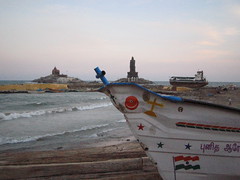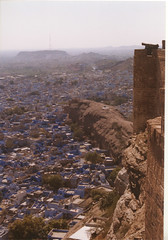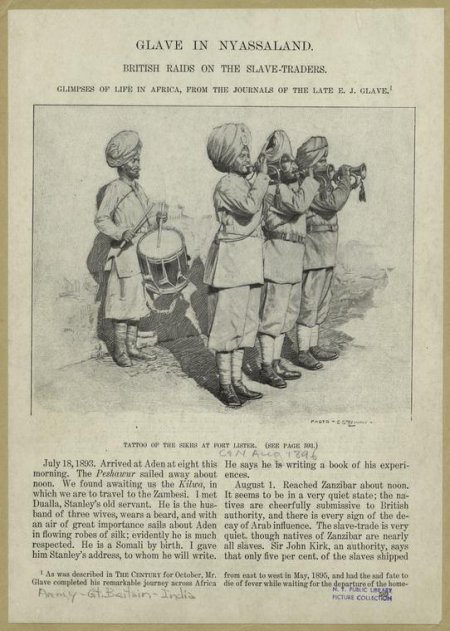Silk shop in Bombay:

Kanyakumari:

Jodhpur fort:

Srinigar-to-Lei:

In the Ellora caves:

From Bhaja Caves, near Pune:

Random guys at the Golden Temple, Amritsar:

I can't wait to go back to India this summer (I hope it works out...)
Postcolonial/Global literature and film, Modernism, African American literature, and the Digital Humanities.







Still, I wonder: If the world's third-richest man is Indian, I feel pretty sure the world's third-poorest man is as well. And the second- and the poorest are probably his neighbours. In fact, I am also pretty sure I saw this third-poorest man yesterday, a sad figure in loose pants and nothing else who, for no clear reason, runs up and down the street near where I live.
It [the term South Asia] has allowed the Indian state to hijack the right to the Indic civilisation, forcing other states in the region to seek new bases for their political cultures and disown crucial aspects of their cultural selves.
Weber's argument centered on ascetic Protestantism. He said that the Calvinist doctrine of predestination led believers to seek to demonstrate their elect status, which they did by engaging in commerce and worldly accumulation. In this way, Protestantism created a work ethic -- that is, the valuing of work for its own sake rather than for its results -- and demolished the older Aristotelian-Roman Catholic doctrine that one should acquire only as much wealth as one needed to live well. In addition, Protestantism admonished its believers to behave morally outside the boundaries of the family, which was crucial in creating a system of social trust.
It is safe to say that most contemporary economists do not take Weber's hypothesis, or any other culturalist theory of economic growth, seriously. Many maintain that culture is a residual category in which lazy social scientists take refuge when they can't develop a more rigorous theory. There is indeed reason to be cautious about using culture to explain economic and political outcomes. Weber's own writings on the other great world religions and their impact on modernization serve as warnings. His book ''The Religion of China: Confucianism and Taoism'' (1916) takes a very dim view of the prospects for economic development in Confucian China, whose culture, he remarks at one point, provides only slightly less of an obstacle to the emergence of modern capitalism than Japan's.
What held traditional China and Japan back, we now understand, was not culture, but stifling institutions, bad politics and misguided policies. Once these were fixed, both societies took off. Culture is only one of many factors that determine the success of a society. This is something to bear in mind when one hears assertions that the religion of Islam explains terrorism, the lack of democracy or other phenomena in the Middle East.
But it goes without saying that religion and religious passion are not dead, and not only because of Islamic militancy but also because of the global Protestant-evangelical upsurge that, in terms of sheer numbers, rivals fundamentalist Islam as a source of authentic religiosity. The revival of Hinduism among middle-class Indians, or the emergence of the Falun Gong movement in China, or the resurgence of Eastern Orthodoxy in Russia and other former Communist lands, or the continuing vibrancy of religion in America, suggests that secularization and rationalism are hardly the inevitable handmaidens of modernization.
Europeans may continue to use terms like "human rights" and "human dignity," which are rooted in the Christian values of their civilization, but few of them could give a coherent account of why they continue to believe in such things. The ghost of dead religious beliefs haunts Europe much more than it does America.
Conrad, Nabokov, Naipaul - these are writers known for having managed to migrate between languages, cultures, countries, continents, even civilisations. Their imaginations were fed by exile, a nourishment drawn not through roots but through rootlessness; mine, however, requires that I stay in the same city, on the same street, in the same house, gazing at the same view. Istanbul's fate is my fate: I am attached to this city because it has made me who I am.
Flaubert, who visited Istanbul 102 years before my birth, was struck by the variety of life in its teeming streets; in one of his letters he predicted that in a century's time it would be the capital of the world. The reverse came true: after the Ottoman empire collapsed, the world almost forgot that Istanbul existed. The city into which I was born was poorer, shabbier, and more isolated than it had ever been its 2,000-year history. For me it has always been a city of ruins and of end-of-empire melancholy.
From the democratic point of view, we must say that in a true democracy nothing should be done for the people. The writer who defines his audience by its limitations is indulging in the unforgivable arrogance. The writer must define his audience by its abilities, by its perfections, so far as he is gifted to conceive them. He does well, if he cannot see his right audience within immediate reach of his voice, to direct his words to his spiritual ancestors, or to posterity, or even, if need be, to a coterie. The writer serves his daemon [creative spirit] and his subject. And the democracy that does not know that the daemon and the subject must be served is not, in any ideal sense of the word, a democracy at all.
What the philosophy of the [French] Revolution lacked or denied it is difficult to find a name for. Sometimes it gets called mysticism, but it is not mysticism and Wordsworth is not a mystic. Sometimes, as if by a kind of compromise, it gets called "mystery," but that, though perhaps closer, is certainly not close enough. What is meant negatively is that man cannot be comprehended in a formula; what is mean positively is the sense of complication and possibility, of surprise, intensification, variety, unfoldment, worth. These are things whose more or less abstract expressions we recognize in the arts; in our inability to give this quality a name, our embarrassment, even, when we speak of it, marks a failure in our thought. But Wordsworth was able to speak of this quality and he involved it integrally with morality and all the qualities of mind which morality suggests.
It is one of the tendencies of liberalism to simplify, and this tendency is natural in view of the effort which liberalism makes to organize the elements of life ian a rational way. And when we approach liberalism in a critical spirit, we shall fail in critical completeness if we do not take into account the value and necessity of its organizational impulse. But at the same time we must understand that organization means delegation, and agencies, and bureaus, and technicians, and that the ideas that can survive delegation, that can be passed on to agencies and bureaus and technicians, incline to be ideas of a certain kind of a certain simplicity: they give up something of their largeness and modulation and complexity in order to survive. The lively sense of contingency and possibility, and of those exceptions to the rule which may be the beginning of the end of the rule--this sense does not suit well with the impulse to organization. So that when we come to look at liberalism in a critical spirit, we have to expect that there will be a discrepancy between what I have called the primal imagination of liberalism and its present particular imagination. The job of criticism would seem to be, then, to recall liberalism to its first essential imagination of variousness and possibility, which implies the awareness of complexity and difficulty.The gestures Trilling is making in the two passages quoted above are not the same, but they do rhyme. In one place, Trilling is asking his readers to take T.S. Eliot's conservatism seriously, by substituting Wordsworth's turn away from radicalism for Eliot's. He uses the example of Wordsworth's prodigious poetic output as proof of the value of the endeavor. In the second instance, Trilling suggests that it is the role of criticism to go against the utilitarian tide -- the dominant stream of technicians, explainers, and by extension to our own day, the shallow ideas that can be presented on Television in a minute or two (or on Internet weblogs in a meme or two). Criticism, he hopes, will be a space where people can think about things that may not necessarily go anywhere, where transparent use-value is not quite the goal.
Fortunately, in my opinion, we as a nation have become confident enough in our own standing and achievements that we can rise above anti-colonial feelings and talk about the colonial period without inhibitions or resentment. Although the Mughals colonised India and even converted our people to their religion four centuries ago, today we take pride in showing tourists monuments like the Taj Mahal as the pride of India. With the passage of time, the same is happening to the monuments and cities built by our European colonisers -- the Portuguese, the Dutch, the French, and the British. For a European tourist it is often more interesting to see remnants of the adventurers from their own countries. Even for the Americans, it is easier to relate to such sites as most of them are descendants of Europeans.
Fortunately, we have several such monuments and sites bearing witness to the history of our European colonisers. We should use them to market our country. Take Pondicherry. It has several French remnants, including the use of the French language. In France schoolchildren are still taught about the French empire in India, which consisted of Pondicherry, Mahe, Karaikkal, and Chandannagar.
These are usually people who have retired and can afford to explore the world outside their own immediate reach. The younger backpackers or student-type tourists are not sufficiently well funded. Therefore, they are not our primary target group although they should also be encouraged and welcomed to this country as they can be our brand ambassadors to the older generations of their countrymen and one day when they can afford it, they may come back with their own families.

Meanwhile, the documentary has had its share of controversies. It has "ethical and stylistic" problems, says Partha Banerjee, interpreter between the filmmakers and the children. He has reportedly written to the Academy Of Motion Picture Arts And Sciences, complaining that the children's lives had worsened. Authorities at Sabera Foundation's home, where some of the children live, said other kids didn't know about their Sonagachhi connection. Now, the award has brought the kids into global prominence.(link)
It leaves out, for instance, the work of many other photographers who have introduced young people who have few worldy prospects to a new life by introducing them to photography.
Shahidul Alam and his colleages have worked for eight years with a group of young photographers who call themselves Out of Focus. (link).
Nancy McGirr teaches photography to children who worked in a garbage dump in Guatemala. (link. Also here)
And Zana Briski is doing her best to make her work in Kolkata more than a one-time event. She started Kids With Cameras (link)
to send other photographers to countries around the world to train children to become photographers. Gigi Cohen (whoalso has worked with Child Labor & the Global Village) is currently in Haiti.

Written text unfolds in space. It's visual first of all, before that miraculous convoy of conversions that make it sensible to the reader. It's a seen thing.
Audible narratives, in contrast, extend in time. They are measured in minutes and seconds, not in column inches. And as each new fragment is heard, the old one is dying away, no longer audible.
So, memory is a part of what makes it work: there is no page to scan, the listener must remember the story. Each word makes sense because of the memory of the ones that preceded it.
This work of memory commands closer attention. And that is even more true now, because most of us can read much faster than we can talk (and much faster than we can comprehend spoken language).